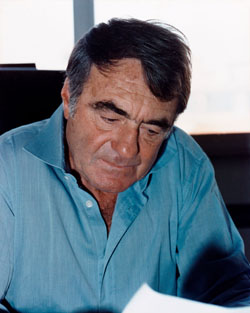
Claude Lanzmann
By the time they’re 88 years old, most people start thinking about slowing down. But not Claude Lanzmann.
The French journalist and documentarian is about to release his seventh film, The Last of the Unjust – a three hour and 40 minute examination of Rabbi Benjamin Murmelstein, the last president of the Jewish Council of the Theresienstadt ghetto in Czechoslovakia.
Murmelstein is one of the most controversial figures of the Holocaust, but Lanzmann has never been one to shy away from the provocative.
Born in 1925 in Paris, Lanzmann became politically active at a young age, participating in the French resistance movement at Blaise Pascal High School in 1943. He became friends with Jean-Paul Satre and Simone de Beauvoir at the University of Berlin in the 1950s and began contributing to Les Temps Modernes, Satre’s literary magazine. Today, Lanzmann is the magazine’s editor in chief.
Lanzmann, a staunch pro-Israel advocate, wrote and reported on various conflicts in Israel and the Middle East. He published a special issue of Les Temps Modernes dedicated to the Arab-Israeli conflict, and was indicted for his denouncement of repression in Algeria.
In 1970, Lanzmann switched to documentary filmmaking full-time. He worked on Shoah from 1974 to 1985, and the nine and a half hour documentary continues to be hailed as one of the most important films about the Holocaust ever made.
The film features interviews with former Nazi perpetrators along with survivors and witnesses of the Holocaust. In an interview with Der Spiegel in 2010, Lanzmann said the film is “not about the survivors.”
“I wanted to get as close as possible to death,” Lanzmann said. “No personal accounts are told in Shoah, no anecdotes. It's only about death.”
Israel, Why (1973) examines the state of Israel just before the Yom Kippur War, and Tsahal (1994) is about the Israel Defense Forces. Lanzmann’s other films include Sobibor, October 14, 1943, 4 p.m (2001), about a young man’s escape from the Sobibor death camp, and A Visitor From the Living (1999), about the falsified International Red Cross report on Theresienstadt.
Lanzmann published his bestselling memoir, The Patagonian Hare, in 2009, and this February he was honored by the Berlin Film Festival for his life achievements.
“I am ageless. I think about death constantly, including my own death. At the same time, it all remains completely unreal,” he told Der Spiegel. “Only life counts.”